Strategies for Promoting Positive Behaviour: A Comprehensive Report
VerifiedAdded on 2020/07/23
|6
|1186
|104
Report
AI Summary
This report comprehensively addresses the promotion of positive behavior within health and social care settings. It begins by emphasizing the importance of positive behavior for individual well-being and social interaction. The report then explores various interventions, including functional behavioral analysis and proactive strategies like physical exercise, good nutrition, and developing a sense of responsibility. It differentiates between proactive and reactive strategies, highlighting the significance of early detection and timely responses to challenging behaviors. A central focus is placed on the person-centered approach, detailing methods like MAPS and PATH for managing challenging behaviors and maintaining dignity and respect. The report also outlines best practices for health and social care takers, such as understanding personal history, promoting individual benefits, and ethical considerations. Finally, it provides steps to maintain dignity and respect, along with measures to check the well-being of individuals with challenging behaviors, including life space interviews and the IESCAPE framework. The report concludes by reiterating the necessity of positive behavior for individual and societal well-being.
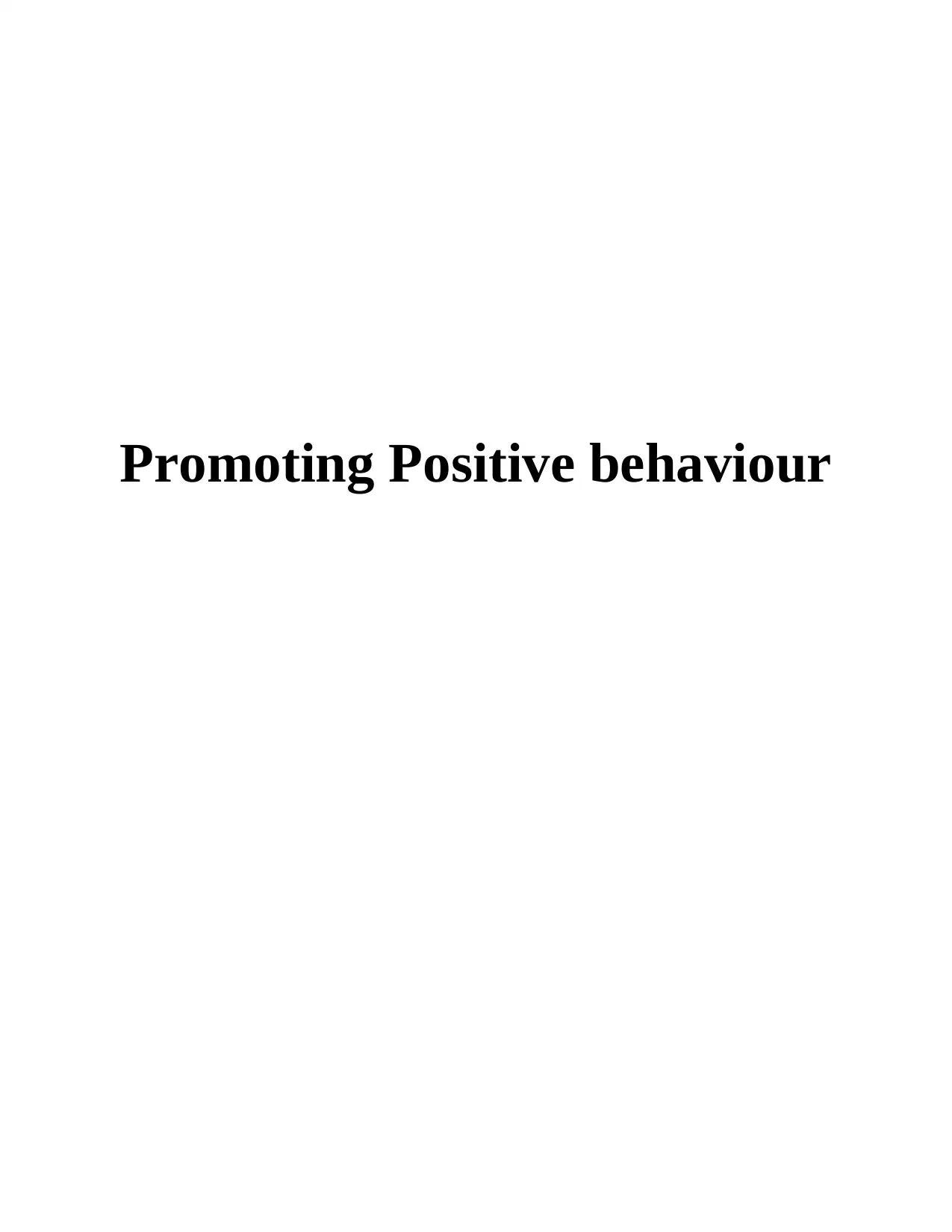
Promoting Positive behaviour
Paraphrase This Document
Need a fresh take? Get an instant paraphrase of this document with our AI Paraphraser

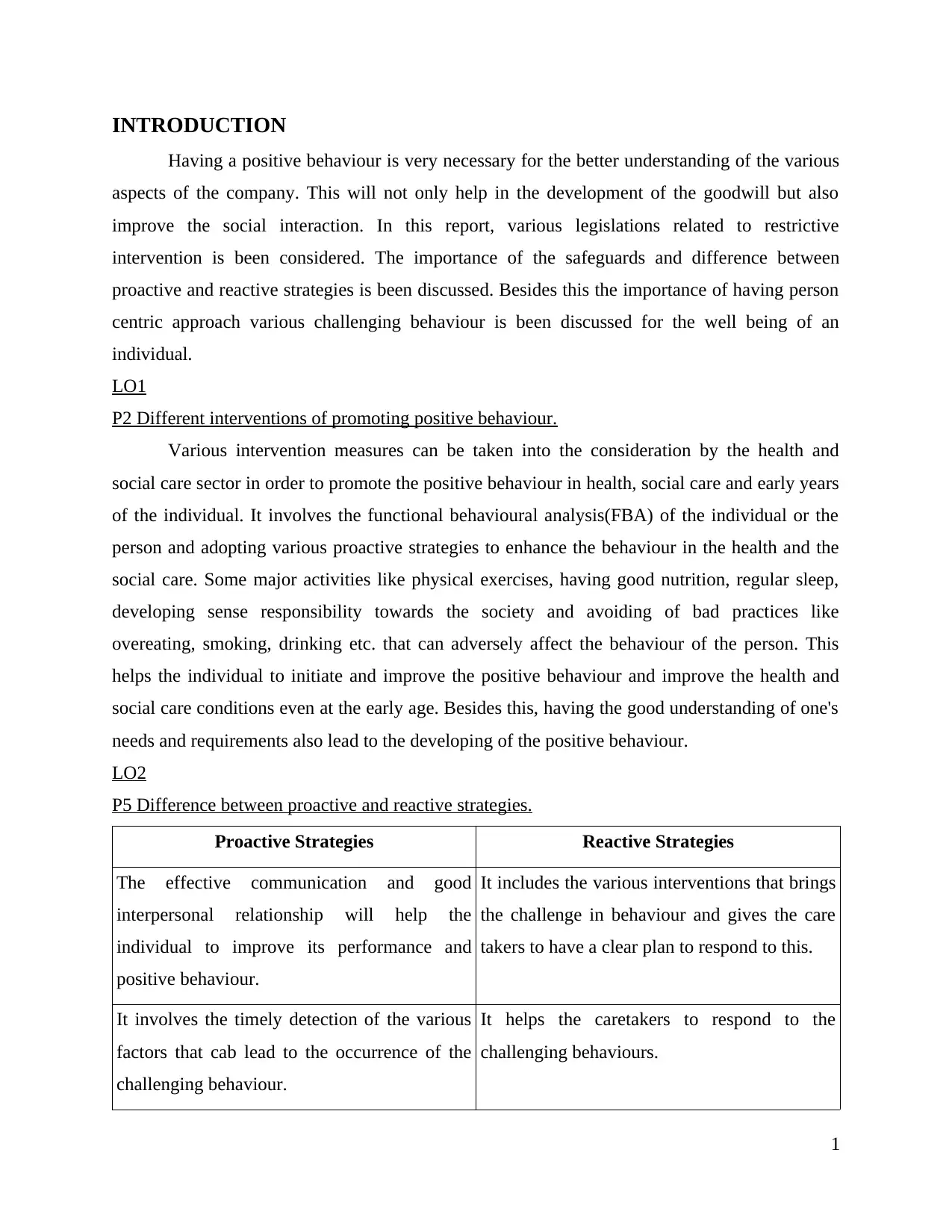
INTRODUCTION
Having a positive behaviour is very necessary for the better understanding of the various
aspects of the company. This will not only help in the development of the goodwill but also
improve the social interaction. In this report, various legislations related to restrictive
intervention is been considered. The importance of the safeguards and difference between
proactive and reactive strategies is been discussed. Besides this the importance of having person
centric approach various challenging behaviour is been discussed for the well being of an
individual.
LO1
P2 Different interventions of promoting positive behaviour.
Various intervention measures can be taken into the consideration by the health and
social care sector in order to promote the positive behaviour in health, social care and early years
of the individual. It involves the functional behavioural analysis(FBA) of the individual or the
person and adopting various proactive strategies to enhance the behaviour in the health and the
social care. Some major activities like physical exercises, having good nutrition, regular sleep,
developing sense responsibility towards the society and avoiding of bad practices like
overeating, smoking, drinking etc. that can adversely affect the behaviour of the person. This
helps the individual to initiate and improve the positive behaviour and improve the health and
social care conditions even at the early age. Besides this, having the good understanding of one's
needs and requirements also lead to the developing of the positive behaviour.
LO2
P5 Difference between proactive and reactive strategies.
Proactive Strategies Reactive Strategies
The effective communication and good
interpersonal relationship will help the
individual to improve its performance and
positive behaviour.
It includes the various interventions that brings
the challenge in behaviour and gives the care
takers to have a clear plan to respond to this.
It involves the timely detection of the various
factors that cab lead to the occurrence of the
challenging behaviour.
It helps the caretakers to respond to the
challenging behaviours.
1
Having a positive behaviour is very necessary for the better understanding of the various
aspects of the company. This will not only help in the development of the goodwill but also
improve the social interaction. In this report, various legislations related to restrictive
intervention is been considered. The importance of the safeguards and difference between
proactive and reactive strategies is been discussed. Besides this the importance of having person
centric approach various challenging behaviour is been discussed for the well being of an
individual.
LO1
P2 Different interventions of promoting positive behaviour.
Various intervention measures can be taken into the consideration by the health and
social care sector in order to promote the positive behaviour in health, social care and early years
of the individual. It involves the functional behavioural analysis(FBA) of the individual or the
person and adopting various proactive strategies to enhance the behaviour in the health and the
social care. Some major activities like physical exercises, having good nutrition, regular sleep,
developing sense responsibility towards the society and avoiding of bad practices like
overeating, smoking, drinking etc. that can adversely affect the behaviour of the person. This
helps the individual to initiate and improve the positive behaviour and improve the health and
social care conditions even at the early age. Besides this, having the good understanding of one's
needs and requirements also lead to the developing of the positive behaviour.
LO2
P5 Difference between proactive and reactive strategies.
Proactive Strategies Reactive Strategies
The effective communication and good
interpersonal relationship will help the
individual to improve its performance and
positive behaviour.
It includes the various interventions that brings
the challenge in behaviour and gives the care
takers to have a clear plan to respond to this.
It involves the timely detection of the various
factors that cab lead to the occurrence of the
challenging behaviour.
It helps the caretakers to respond to the
challenging behaviours.
1
⊘ This is a preview!⊘
Do you want full access?
Subscribe today to unlock all pages.

Trusted by 1+ million students worldwide
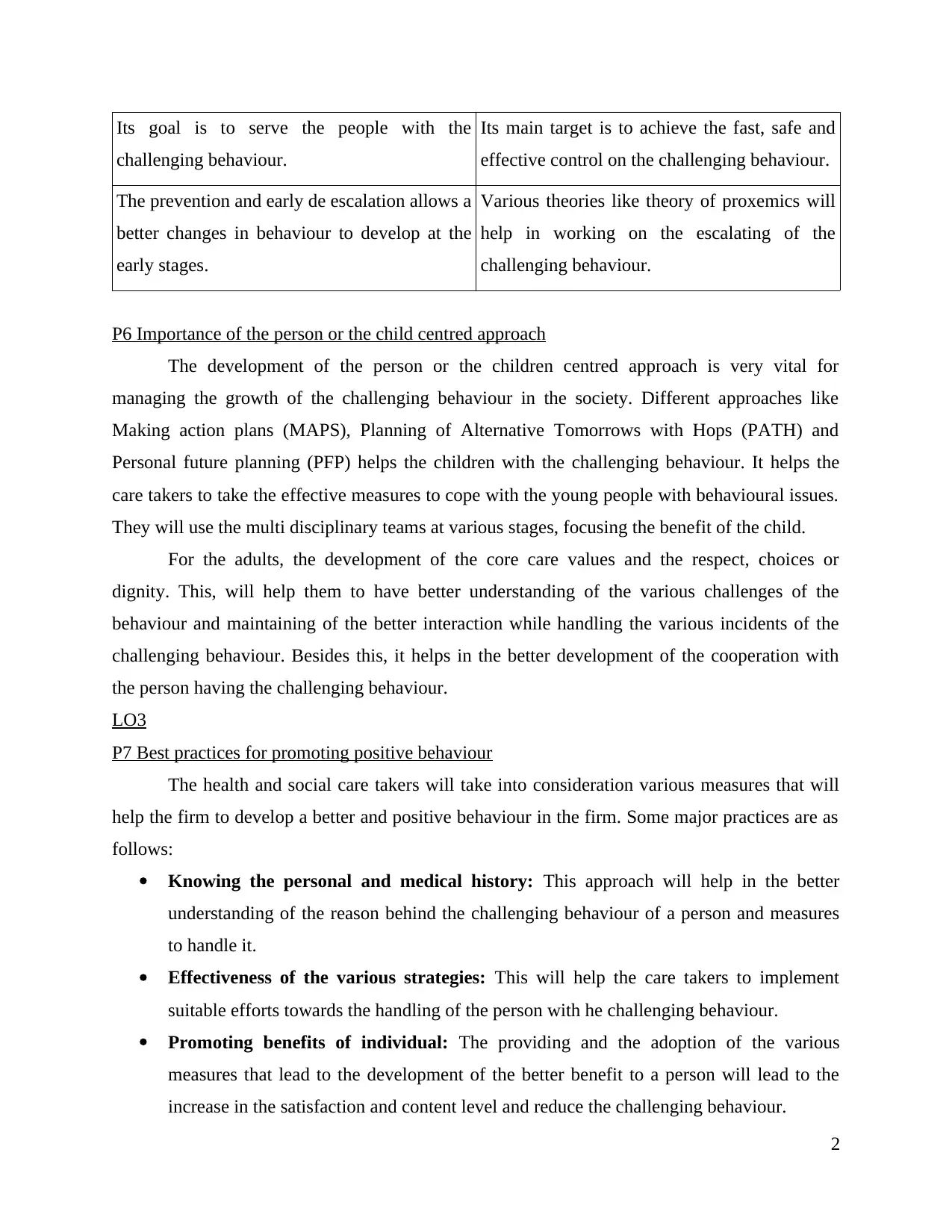
Its goal is to serve the people with the
challenging behaviour.
Its main target is to achieve the fast, safe and
effective control on the challenging behaviour.
The prevention and early de escalation allows a
better changes in behaviour to develop at the
early stages.
Various theories like theory of proxemics will
help in working on the escalating of the
challenging behaviour.
P6 Importance of the person or the child centred approach
The development of the person or the children centred approach is very vital for
managing the growth of the challenging behaviour in the society. Different approaches like
Making action plans (MAPS), Planning of Alternative Tomorrows with Hops (PATH) and
Personal future planning (PFP) helps the children with the challenging behaviour. It helps the
care takers to take the effective measures to cope with the young people with behavioural issues.
They will use the multi disciplinary teams at various stages, focusing the benefit of the child.
For the adults, the development of the core care values and the respect, choices or
dignity. This, will help them to have better understanding of the various challenges of the
behaviour and maintaining of the better interaction while handling the various incidents of the
challenging behaviour. Besides this, it helps in the better development of the cooperation with
the person having the challenging behaviour.
LO3
P7 Best practices for promoting positive behaviour
The health and social care takers will take into consideration various measures that will
help the firm to develop a better and positive behaviour in the firm. Some major practices are as
follows:
Knowing the personal and medical history: This approach will help in the better
understanding of the reason behind the challenging behaviour of a person and measures
to handle it.
Effectiveness of the various strategies: This will help the care takers to implement
suitable efforts towards the handling of the person with he challenging behaviour.
Promoting benefits of individual: The providing and the adoption of the various
measures that lead to the development of the better benefit to a person will lead to the
increase in the satisfaction and content level and reduce the challenging behaviour.
2
challenging behaviour.
Its main target is to achieve the fast, safe and
effective control on the challenging behaviour.
The prevention and early de escalation allows a
better changes in behaviour to develop at the
early stages.
Various theories like theory of proxemics will
help in working on the escalating of the
challenging behaviour.
P6 Importance of the person or the child centred approach
The development of the person or the children centred approach is very vital for
managing the growth of the challenging behaviour in the society. Different approaches like
Making action plans (MAPS), Planning of Alternative Tomorrows with Hops (PATH) and
Personal future planning (PFP) helps the children with the challenging behaviour. It helps the
care takers to take the effective measures to cope with the young people with behavioural issues.
They will use the multi disciplinary teams at various stages, focusing the benefit of the child.
For the adults, the development of the core care values and the respect, choices or
dignity. This, will help them to have better understanding of the various challenges of the
behaviour and maintaining of the better interaction while handling the various incidents of the
challenging behaviour. Besides this, it helps in the better development of the cooperation with
the person having the challenging behaviour.
LO3
P7 Best practices for promoting positive behaviour
The health and social care takers will take into consideration various measures that will
help the firm to develop a better and positive behaviour in the firm. Some major practices are as
follows:
Knowing the personal and medical history: This approach will help in the better
understanding of the reason behind the challenging behaviour of a person and measures
to handle it.
Effectiveness of the various strategies: This will help the care takers to implement
suitable efforts towards the handling of the person with he challenging behaviour.
Promoting benefits of individual: The providing and the adoption of the various
measures that lead to the development of the better benefit to a person will lead to the
increase in the satisfaction and content level and reduce the challenging behaviour.
2
Paraphrase This Document
Need a fresh take? Get an instant paraphrase of this document with our AI Paraphraser
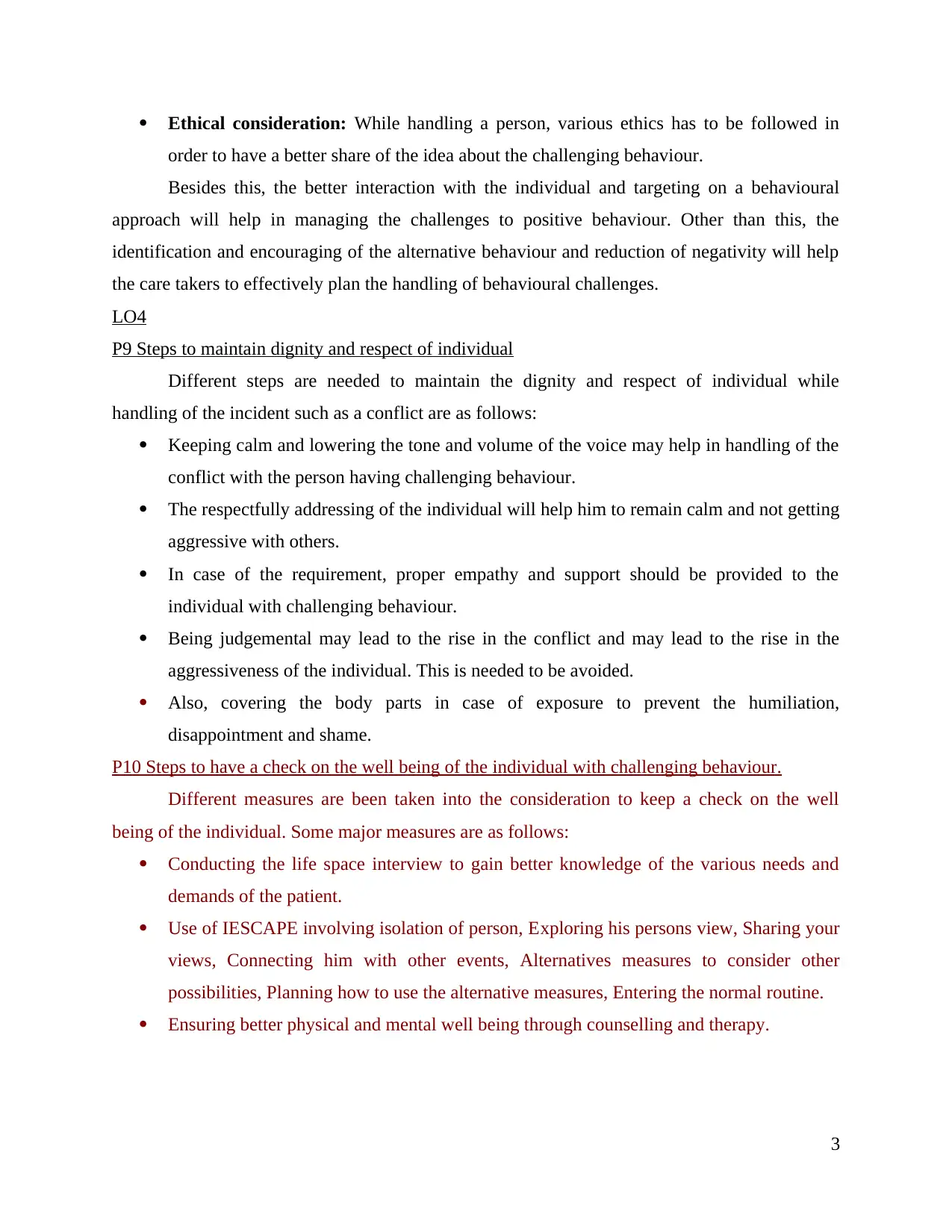
Ethical consideration: While handling a person, various ethics has to be followed in
order to have a better share of the idea about the challenging behaviour.
Besides this, the better interaction with the individual and targeting on a behavioural
approach will help in managing the challenges to positive behaviour. Other than this, the
identification and encouraging of the alternative behaviour and reduction of negativity will help
the care takers to effectively plan the handling of behavioural challenges.
LO4
P9 Steps to maintain dignity and respect of individual
Different steps are needed to maintain the dignity and respect of individual while
handling of the incident such as a conflict are as follows:
Keeping calm and lowering the tone and volume of the voice may help in handling of the
conflict with the person having challenging behaviour.
The respectfully addressing of the individual will help him to remain calm and not getting
aggressive with others.
In case of the requirement, proper empathy and support should be provided to the
individual with challenging behaviour.
Being judgemental may lead to the rise in the conflict and may lead to the rise in the
aggressiveness of the individual. This is needed to be avoided.
Also, covering the body parts in case of exposure to prevent the humiliation,
disappointment and shame.
P10 Steps to have a check on the well being of the individual with challenging behaviour.
Different measures are been taken into the consideration to keep a check on the well
being of the individual. Some major measures are as follows:
Conducting the life space interview to gain better knowledge of the various needs and
demands of the patient.
Use of IESCAPE involving isolation of person, Exploring his persons view, Sharing your
views, Connecting him with other events, Alternatives measures to consider other
possibilities, Planning how to use the alternative measures, Entering the normal routine.
Ensuring better physical and mental well being through counselling and therapy.
3
order to have a better share of the idea about the challenging behaviour.
Besides this, the better interaction with the individual and targeting on a behavioural
approach will help in managing the challenges to positive behaviour. Other than this, the
identification and encouraging of the alternative behaviour and reduction of negativity will help
the care takers to effectively plan the handling of behavioural challenges.
LO4
P9 Steps to maintain dignity and respect of individual
Different steps are needed to maintain the dignity and respect of individual while
handling of the incident such as a conflict are as follows:
Keeping calm and lowering the tone and volume of the voice may help in handling of the
conflict with the person having challenging behaviour.
The respectfully addressing of the individual will help him to remain calm and not getting
aggressive with others.
In case of the requirement, proper empathy and support should be provided to the
individual with challenging behaviour.
Being judgemental may lead to the rise in the conflict and may lead to the rise in the
aggressiveness of the individual. This is needed to be avoided.
Also, covering the body parts in case of exposure to prevent the humiliation,
disappointment and shame.
P10 Steps to have a check on the well being of the individual with challenging behaviour.
Different measures are been taken into the consideration to keep a check on the well
being of the individual. Some major measures are as follows:
Conducting the life space interview to gain better knowledge of the various needs and
demands of the patient.
Use of IESCAPE involving isolation of person, Exploring his persons view, Sharing your
views, Connecting him with other events, Alternatives measures to consider other
possibilities, Planning how to use the alternative measures, Entering the normal routine.
Ensuring better physical and mental well being through counselling and therapy.
3
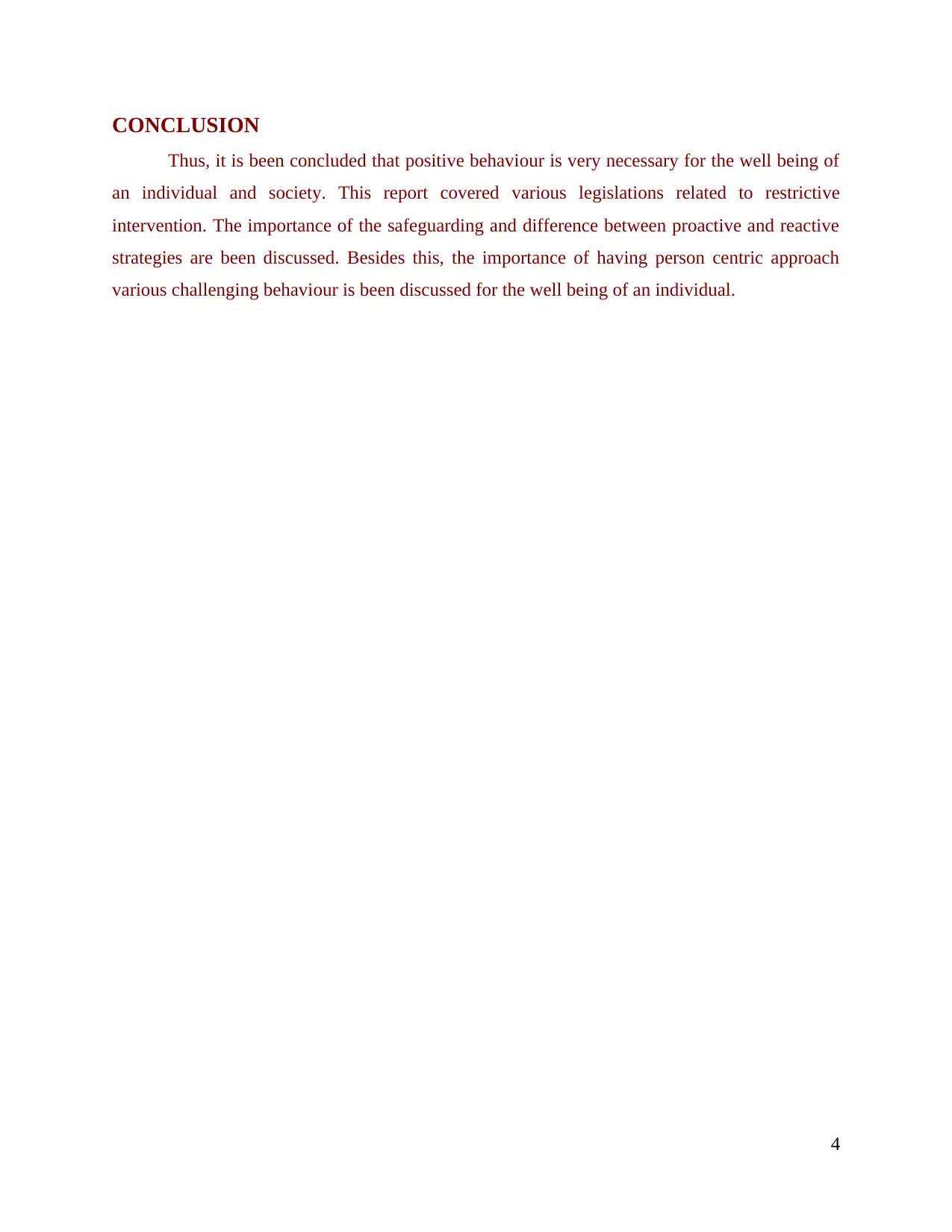
CONCLUSION
Thus, it is been concluded that positive behaviour is very necessary for the well being of
an individual and society. This report covered various legislations related to restrictive
intervention. The importance of the safeguarding and difference between proactive and reactive
strategies are been discussed. Besides this, the importance of having person centric approach
various challenging behaviour is been discussed for the well being of an individual.
4
Thus, it is been concluded that positive behaviour is very necessary for the well being of
an individual and society. This report covered various legislations related to restrictive
intervention. The importance of the safeguarding and difference between proactive and reactive
strategies are been discussed. Besides this, the importance of having person centric approach
various challenging behaviour is been discussed for the well being of an individual.
4
⊘ This is a preview!⊘
Do you want full access?
Subscribe today to unlock all pages.

Trusted by 1+ million students worldwide
1 out of 6
Related Documents
Your All-in-One AI-Powered Toolkit for Academic Success.
+13062052269
info@desklib.com
Available 24*7 on WhatsApp / Email
![[object Object]](/_next/static/media/star-bottom.7253800d.svg)
Unlock your academic potential
Copyright © 2020–2026 A2Z Services. All Rights Reserved. Developed and managed by ZUCOL.





